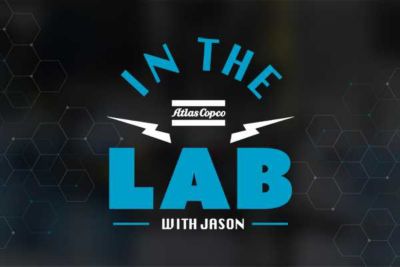
Register for our upcoming webinar on SAG Mill Maintenance
Streamlined SAG Mill Maintenance with the Right Tools
Efficiency is crucial in mining, as improper fastening risks production impact and operator safety. Learn more in this upcoming webinar.
Register nowWhen a mill is down for unplanned maintenance, there can be $380k in lost revenue every hour – that can add up to $3,040,000 over the course of eight hours! It goes without saying that every minute of downtime for repairs and maintenance can add up and negatively affect your profits, which is why increasing uptime in the mining industry is vital. But how can you reduce downtime? When maintaining a grinding mill, there are four things that you could be doing differently to reduce the time it’s down for repair and maintenance and eliminate unplanned downtime scenarios from occurring. These scenarios can occur from several different factors, but perhaps the tools your operators are using are to blame.
Atlas Copco has designed quicker, safer, and smarter tools with ergonomic features and high power-to-weight ratios fit for the mining industry. So, when it comes to liner removal, pre-assembly, final torque tightening, or data collection, we have the tools to fit your needs. Read on to learn about four ways in which you can reduce unplanned downtime and the overall cost of unexpected maintenance.
Ditch the bolt cutters
The next time your operators need to remove the waste liner of a grinding mill, use a more powerful impact wrench. Removing all the bolts on the liner can take enough time away from productivity, but did you know that about 10-15% of the nuts cannot be loosened with typical impact wrenches? Typical impact wrenches have a maximum torque not exceeding 4,000 Nm. This means that operators will have to use bolt cutters to remove the remaining bolts that the impact wrench failed to remove. This is not only a tedious task, but it also increases the time your mill is down, thus negatively impacting profits.
To get those bolts removed the first time, opt for a more powerful impact wrench like Atlas Copco’s LMS88. Unlike typical impact wrenches, the LSM88 has a maximum torque of 10,000 Nm, which will eliminate the need for bolt cutters. This is because Atlas Copco’s LMS 8 series of impact wrenches feature high power and exceptional speed for tightening and turning joints, enabling operators to remove all the bolts the first time. This will eliminate the need for additional tools and reduce the overall downtime of the mill.

Effective pre-assembly
There are two things to consider for effective pre-assembly: the speed at which operators can work and the weight of the tool. Of course, the power of the tool is essential to enabling operators to complete tasks at a faster rate, thus reducing downtime. For example, the use of an impact wrench for pre-tightening bolted connections allows you to maintain a high speed of work.
However, when picking the right impact wrench for the job, it is important to consider the weight of the tool as well. For heavier tools, more operators may be needed to compensate for the weight. By reducing the weight, the tool will be more ergonomically fit for the operators and require less of them to operate, freeing up some of the operators to get more work accomplished.
A great example of an impact wrench that can meet all these requirements is the LMS68. The LMS68 weighs less than typical impact wrenches without forfeiting any of the power that typical impact wrenches have. Due to the LMS68 weighing 9.6 KG (21 lbs), only two operators are needed. Additionally, using an impact wrench such as the LMS68 is faster than high torque electric or hydraulic tools. So, not only are fewer users operating one tool, but the LMS68 will allow them to get the job done faster.
Final torque tightening
Did you know that by using an electric nutrunner for final torque tightening you could reduce unplanned mill downtime? While speed is important to keeping the mill maintained and running, accuracy is equally important. During planned mill lining replacement work, we suggest pre-tightening with an electric nutrunner (where permitted by the equipment manufacturer) and then applying high-speed, non-impact torque tightening to the final torque. While impact wrenches are fast, electric nutrunners, like our Tensor REVO HA is very accurate and the fastest on the market. So, when it comes to accuracy, operators won’t have to give up speed. They can pair Atlas Copco’s Tensor REVO with the LMS68 impact wrench to reduce liner assembly time by at least 50%!

Data collection
As Industry 4.0 progresses, so too does technology, which includes the Tensor REVO HA. In addition to being accurate and saving time for bolt maintenance, the Tensor REVO is also great for monitoring torque and angle. This will assure that the job was completed accurately because it will be clear if a bolt has been over- or under-torqued ,which is a sign of premature liner failure. With this knowledge, operators are better equipped to be able to predict unplanned downtime before it happens and correct it proactively.
This step, if skipped, can result in loose or broken bolts, unplanned mill downtime, damage, or personal injury, all of which are costly to operators, their health and safety, and the company. To avoid these scenarios, incorporate Atlas Copco’s Tensor REVO HA into your liner assembly process and reduce the overall time of planned work as well as prevent most emergency shutdowns due to loosened and/or breaking bolts.
Want to learn more about mainenance in the Mining industry? Contact us today!

Register for our upcoming webinar on SAG Mill Maintenance
Streamlined SAG Mill Maintenance with the Right Tools
Efficiency is crucial in mining, as improper fastening risks production impact and operator safety. Learn more in this upcoming webinar.
Register now





